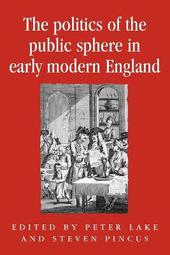
|
The Politics of the Public Sphere in Early Modern England: Public Persons and Popular Spirits
Paperback / softback
Main Details
| Title |
The Politics of the Public Sphere in Early Modern England: Public Persons and Popular Spirits
|
| Authors and Contributors |
Edited by Peter Lake
|
|
Edited by Steve Pincus
|
| Series | Politics, Culture and Society in Early Modern Britain |
|---|
| Physical Properties |
| Format:Paperback / softback | | Pages:288 | | Dimensions(mm): Height 234,Width 156 |
|
| Category/Genre | British and Irish History |
|---|
| ISBN/Barcode |
9780719053184
|
| Classifications | Dewey:942.05 |
|---|
| Audience | | Professional & Vocational | | Tertiary Education (US: College) | |
|---|
| Illustrations |
Illustrations, black & white
|
|
Publishing Details |
| Publisher |
Manchester University Press
|
| Imprint |
Manchester University Press
|
| Publication Date |
1 July 2012 |
| Publication Country |
United Kingdom
|
Description
This book uses the notion of the public sphere to produce a new view of the history of England in the post reformation period, tracing its themes from the 1530s to the early eighteenth century. The contributors, who are all leaders in their own fields, bring a diverse range of approaches to bear on the central theme. The book aims to put the results of some of the most innovative and exciting work in the field before the reader in accessible form. Each chapter stands alone in representing an important contribution to its own area of study and sub-period as well as to the overall argument of the book. Politics, culture and religion all feature prominently in the resulting analysis, which should be of interest to students and academics of early modern English history and literature. -- .
Author Biography
Peter Lake is University Distinguished Professor of History at Vanderbilt University|Steven Pincus is Bradford Durfee Professor of History at Yale University -- .
Reviews"An important collection of a very high quality that brings together themes in recent political, religious and cultural history around a sustained and intelligent engagement with Habermas." - Professor Michael Braddick, University of Sheffield
|